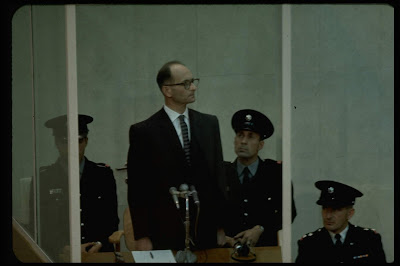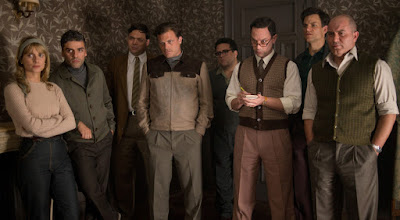or
"They Pop Up Everywhere, Like Mushrooms After the Rain"
Years and years and years ago, I read "The House on Garibaldi Street," written by former Mossad chief Isser Harel detailing the capture of "The Last Nazi," Adolf Eichmann, the SS "obersturmbannfuhrer" appointed (by Reinhard Heydrich) with the job outlining the transportation of Jews to concentration camps as part of the Nazi "Final Solution," becoming known as "The Architect of the Holocaust". Eichmann managed to use the confusion of the post-war era to escape from Germany to Austria and then on to Argentina through the use of forged papers and heavily greased palms. But, after the war, he became the focus of a man-hunt by Holocaust survivors, where his presence in Argentina became known. Although more concerned with Israel's internal security, Harel was persuaded to undertake the capture of Eichmann—assassination was not considered after the execution of others, whose identity as Eichmann had not been verified—to bring him to Israel for trial. Shin Bet agents were dispatched for positive identification and only after it was determined they had their man, another team was dispatched to capture him and transport him back to Israel.
Sounds relatively easy. But, like any good "Impossible Mission," there will always be complications, especially given an undertaking of this sort. International boundaries are crossed. Foreign agents are in a foreign land. The extraction of a citizen amounts to kidnapping. Then, there are bureaucratic details that must be overcome, which, given the nature of the mission, can seen to be so much red tape, especially when there are lives on the line. It only complicates an already complicated situation, which adds to the drama. It's a natural for dramatization.
"The House on Garibaldi Street" was made into a television film in 1979. American network TNT made a TV movie called "The Man Who Captured Eichmann" with Robert Duvall and Arliss Howard. Now, along comes Operation Finale, written by Matthew Orton (based on "Eichmann in my Hands," written by Shin Bet operative Peter Malkin) and directed by Chris Weitz (he of American Pie, About a Boy, The Golden Compass, and Twilight: New Moon) as a sort of passion project and goes into some of the more interesting details as well as the psychology of the team on the mission. It's based on Malkin's book, so Malkin is the focus, that cause not being hurt by the fact that one of the producers is Oscar Isaac who plays Malkin.
Operation Finale begins on a woman's face looking at us from the screen; she is the sister of Peter Malkin, killed by SS troops as she attempts to hide in the woods with her children to keep them from the slaughter. Malkin sees this as he looks in the mirror, shaving, a memory, an imagining of the event that haunts him and drives him. And gets him in trouble. Malkin doesn't have a good reputation with Shin Bet; he's been demoted to training other agents after a German living in Argentina is shot for war-crimes in a case of mistaken identity. Other agents don't trust him and are only too quick to tell him that. But, he still burns to go back in the field, even if the Mossad is less concerned with Nazi-hunting than they are with current threats to their border. Better fending off future threats than avenging the ones of the past.
And something has come up in Argentina, which is starting to go through a surge of heightened anti-semitism and white nationalism. Nazi's have nothing to do with irony, so no one ever stops to think that it might be strengthened by the fact that the country is harboring fugitive Nazi's. Of course, the country is in danger of being infiltrated by outsiders because a German ex-patriate told me so.
But, just when the hunting stops, life intrudes with one of those little happenstances that defy the most careful planning and derails the most entrenched of secrets (it's why conspiracy theories are usually wrong—the truth will out, and if it doesn't, it isn't truth*). The daughter (Haley Lu Richardson) of a Holocaust survivor, Lothar Hermann (Peter Strauss), starts to date a young man names Klaus—Klaus Eichmann—and things go far enough that Klaus is invited over for dinner and Hermann, who is half-Jewish (he was sent to the camps for being a socialist) is able to play along with his suspicions about his young dinner guest, who has definite antisemitic views—"The Jews, they pop up everywhere, like mushrooms after the rain" (you could say the same thing about Nazi's, eh?)—and is proud of his father's service in the SS. Lothar asks him if he's still alive and young Klaus says that, no, he was killed during the war and he actually lives with his uncle, who is also from Germany.
It's enough for Lothar to contact Israeli authorities that he may have found a link to Adolf Eichmann, but the Mossad are dis-interested, due, not only to their current security concerns, but also that the source of the information, Lothar Hermann, is blind, due to the many beatings he endured at the Dachau work camp.Although the Mossad is slow to pursue Eichmann, there are factions that won't let it rest and plans are drawn up for an investigation to be led by Harel (Lior Raz) to, first, contact the Hermanns so that they can survey the house and maybe capture a photograph of the "uncle" to see if it is Eichmann, and, if his identity can be confirmed, send another team in for a "snatch and extract" to take Eichmann back to Israel to stand trial for war-crimes. Because Malkin has messed up in the past, agent Zvi Aharoni (Michael Aronov), a meticulous researcher is sent first to Argentina to determine the identity of "the uncle" and get photographs, if possible. Aharoni doesn't like Malkin, and would be just as glad if he didn't have anything to do with the assignment, but Malkin is assigned to do the extraction, if it comes to that.
Back in Argentina, Klaus and the daughter, Sylvia, have broken up—he'd invited her to a get-together of friends, which turns out to be a gathering of Nazi sympathizers, whose main agenda for the evening is big talk about exterminating Jews. Sylvia runs away in horror. But, it provides an opportunity for the Shin Bet agents to use her to get more information by pretending to a reconciliation. Sylvia goes to the Eichmann home on Garibaldi Street where she meets "the uncle," whom Klaus, during a heated moment calls "father." The uncle is actually Eichmann.
The second team, which includes an old flame of Malkin's, Dr. Hanna Elian (Melanie Laurent)—she is a fictionalized version of a male doctor enlisted to drug Eichmann to get him on the plane out, presumably to add an emotional element to the story—each take their own route to Argentina, set up a safe-house in which to house their intended captive, and monitor Eichmann's activities. True to an SS officer's form, his schedule is like clockwork ("a human metronome" as Malkin calls him), taking a bus every morning to his job as a supervisor at a Mercedes Benz plant, returning at night to home and family.
But, like any best-laid plan, or intricately-timed spy mission, things can get changed, no matter how steady the target. When Eichmann's regular bus comes and goes, the SS man isn't on it. It turns out, Eichmann has missed the first bus after his shift by the merest of caprice—he stands watching, fascinated, at a flock of birds making intricate patterns in the sky during a feeding frenzy. Tense minutes tick by, as the agents wonder what might have gone wrong. Just when they're about to abandon the activity for the night, the next bus arrives and Eichmann's on it. The Israeli's regroup and Malkin takes the lead, walking toward Eichmann and saying the merest of distractions—"Uno momentito, senor"—then grabs Eichmann in a choke-hold, covering his mouth and immobilizing him, while the other two agents rush to assist. Eichmann has only a moment to let out a yell—heard by his wife (Greta Scacchi) preparing dinner—before he is carted off to a waiting car.
Mission accomplished.
But, getting him out of Argentina undetected is another matter. A planned El Al flight is postponed—for ten days—and with a bureaucratic caveat—they must produce a letter, signed by Eichmann, giving his consent to be extradited to Israel. It's an insane request, but one that has to be met if the agents are to leave the country with their captive. What motivation could possibly compel Eichmann to sign what amounts to a confession and permission for his trial and probably execution? They have ten days. What do they do? Talk about your mission: impossible.
There then becomes a race against time as the agents in the safe-house try to persuade Eichmann to agree to sign the extradition paper and keeping their composure with each other knowing that they have ten days to do it, while at the same time, outside, the Argentinian crypto-nazi's, who learn of Eichmann's disappearance (from his son), do a very thorough search for him throughout the city. Those ten days are tests of will among the participants, as the Israeli's, who naturally vilify Eichmann, must take care of him and keep him healthy, while also trying to coerce him to sign what amounts to his death warrant...or they can't leave. And Eichmann is a tough study: "This guy convinced rabbi's to load the trains!" one of them points out, when there's a moment of underestimating him.
This sounds like it would be unremittingly grim, but it, surprisingly, isn't. The script is smart, often witty, and darkly ironic. Director Weitz knows his thriller playbook very well, and manages to improve on some standard tropes keeping them fresh and taut, cross-cutting increasingly fast between the safe-house and the groups looking for it, and there is a particularly deft camera-tango for a restaurant scene where exchanges are made. It is accompanied by something that's becoming quite rare in films these days—a great, showy score by the increasingly dependable Alexandre Desplat that gets under your skin and ramps up the tension while being melodic, as well. It completes a package that makes Operation Finale feel more like it's out of the classic era of film-making and films where there is less emphasis on flash and more on the good presentation of ideas. |
| Adolf Eichmann on trial in Israel: "The Man in the Glass Booth" |
* Or, in simpler terms, "Man conspires and God laughs." Plus there's the predilection that if somebody does something, they're going to want it be known. Just Mark Felt.











No comments:
Post a Comment